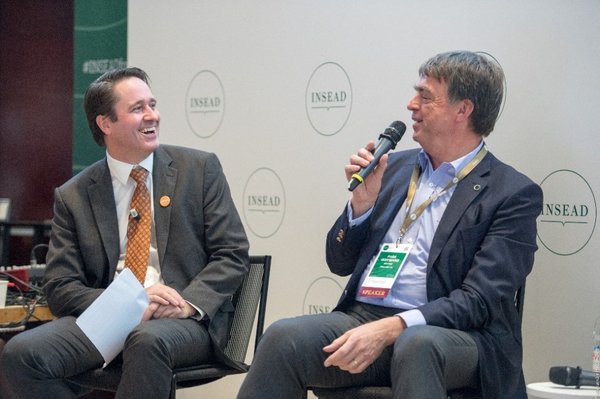Business, Government and Media must regain public trust
Academics,business and government leaders at INSEAD Forums discuss responsible leadership and global stewardship
FONTAINEBLEAU,France,SINGAPORE,and ABU DHABI,United Arab Emirates,Dec. 13,2018 -- INSEAD,the business school for the world,is taking its concept of business as a force for good to a global audience. Following the launch of the Campaign for INSEAD: A Force for Goodevent at its Europe Campus,focus turned to Singapore,where the recent INSEAD Forum Asia and the Campaign for INSEAD Launch brought together leaders from across Asia to discuss more responsible leadership.
The world is currently writing an important chapter that complements business innovation and intergovernmental cooperation – the chapter on integration. At the same time,we also see loss of trust in governments,businesses and institutions,which may hinder global integration of business and societal goals.
According to the 2018 Edelman Trust Barometer,trust in business,government and media in many markets remains dismal. In some countries,only 30 percent of people trust business. Globally,60 percent agree that CEOs are driven more by greed than a desire to make a positive difference in the world. And media has become the least-trusted global institution.
How governments and businesses can regain trust
In his keynote address at the INSEAD Forum Asia and the Campaign for INSEAD Launch in Singapore,Mr Chan Chun Sing,Minister for Trade and Industry of Singapore provides three insights into how business and government can be a force for good and begin building trust.
First,evolvethe open rules-based global trading system so that economic gains are shared equally. Second,unleash the potential of people through a meritocratic system where achievements are based on talent and effort. Third,embrace the values thatput society ahead of personal interests and imbue in all people a sense of stewardship.
Minister Chan cautions that how the world manages growing disparities will have significant global political impact. If the disparity between those who win more and those who win less is not well managed,it can translate into global backlash against integration.
Similar commentary emerged from global business leaders in "Business as a Force for Good" panel discussions moderated byPeter Zemsky,INSEAD Deputy Dean and Dean of Innovation,at INSEAD Forums in France and Singapore.
Andre Hoffmann MBA'90D,Vice Chairman of Roche Holdings,shared how Roche integrates societal values into the company's business model,which has placed the company atop the healthcare sector in the Dow Jones Sustainability Indices for ten years running. He states that,"We've got to the point where it is becoming really part of the DNA of the company. If we have businesses that manage well their relationship with the planet and with the markets – efficiently and sufficiently; morally and with a sense of purpose – we will not need philanthropy any more. Because the root cause of all these issues will have disappeared. So I think it is very important to amalgamate the two as quickly as possible."

Peter Zemsky (left),with Andre Hoffmann MBA’90D,Vice Chairman of Roche Holdings,at The Force for Good Conference on 5 October 2018.
Piyush Gupta, Group CEO of DBS Bank,Singapore,elaborated on the bank's "do no harm,do more good" responsible banking programme,which focuses on scaling up renewable energy,green bonds,social housing,financial inclusion and gender diversity. He asserts that,"The idea about business for good is so important because this cannot be done by governments alone,nor by society or the NGOs. The only platform and the most relevant entity which has the capacity to do things and to move things along,is private sector corporations. This is the reality in today's world."
Subi Rangan,Professor of Strategy and Management at INSEAD,highlighted that businesses and institutions,which are created and led by individuals in power,need to use power as a force for good. He says that individuals would do well to remember that,"We can regulate power. Trust is always coming back to the use of power,and the purpose for which it is being used. When we abuse power then trust goes down,but if we use power in positive ways,trust can be inculcated."
How business schools can play their part
INSEAD is committed to developing responsible leaders who transform business and society. The concept of stewardship is important. The school has integratedglobal insights on business and society issues into its new MBA curriculumand executive education programmes to prepare students and participants – the world's current and future leaders – for global challenges and tough conversations ahead.
INSEAD also aims to lead conversation and spark action around the most pressing issues facing the world today through the newly established Hoffmann Global Institute for Business and Society.
Peter Zemsky,Deputy Dean and Dean of Innovation at INSEAD,says that,"By sharing the action by those leading the way,we hope to inspire more individuals and leaders in more businesses and institutions around the world,including media. We all need to examine our power and influence,increase trust with society and act as a force for good in the world. At INSEAD,we take our responsibility to develop global business leaders who understand the relationship between business and society very seriously."
Responsible leadership and sound stewardship of natural capital canregain public trust. This is how business can be a force for good at the community level and lay a foundation for growth over generations. This is how we can integrate the goals of business and society and usher in a new era of prosperity.
Join INSEAD faculty and alumni,alongside global business and thought leaders,to continue this critical conversation at the upcomingGlobal Business Leaders Conference and Campaign Launch for INSEAD in Middle East on 24 February 2019.
For media inquiries:
Aileen Huang
aileen.huang@insead.edu
Cheryl Ng
cheryl.ng@insead.edu
Photo - /20181213/2325959-1